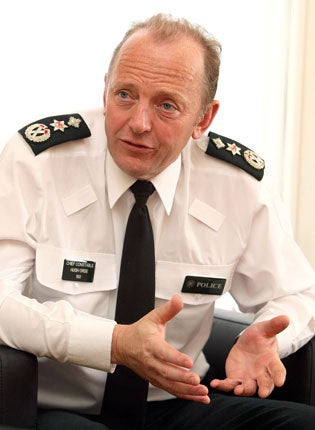Acpo boss: 'lunatics' will win with Tory police plan
Senior officer tells the Conservatives to keep party politics out of policing

Your support helps us to tell the story
From reproductive rights to climate change to Big Tech, The Independent is on the ground when the story is developing. Whether it's investigating the financials of Elon Musk's pro-Trump PAC or producing our latest documentary, 'The A Word', which shines a light on the American women fighting for reproductive rights, we know how important it is to parse out the facts from the messaging.
At such a critical moment in US history, we need reporters on the ground. Your donation allows us to keep sending journalists to speak to both sides of the story.
The Independent is trusted by Americans across the entire political spectrum. And unlike many other quality news outlets, we choose not to lock Americans out of our reporting and analysis with paywalls. We believe quality journalism should be available to everyone, paid for by those who can afford it.
Your support makes all the difference.One of Britain's most senior police officers has launched a robust attack on the Conservative Party's proposal to introduce directly elected police commissioners, warning that it could lead to some forces falling under the control of far-right extremists.
Sir Hugh Orde, the president of the Association of Chief Police Officers (Acpo), said he was opposed to the idea and gave a warning that public apathy voting could lead to "lunatics" being elected to take charge of forces.
Speaking to The Independent, Sir Hugh's comments came at the end of a week that saw the issue of politics in policing rear its head yet again. On Thursday, the Conservative deputy London Mayor, Kit Malthouse, claimed that his party had "its hands on the tiller" of the Metropolitan Police – a suggestion flatly denied by the Scotland Yard Commissioner, Sir Paul Stephenson. Now Sir Hugh, Britain's second most senior officer after Sir Paul, has called on the Conservative Party to explain exactly how it plans to alter the leadership of Britain's police forces should it be elected at the next general election.
Sir Hugh said: "No one has articulated to me or anyone else what the elected commissioner plan actually looks like. I know that Labour have stepped back from it, but the Conservatives are still committed to it. They need to talk to us about what exactly they are talking about doing.
"Do they think that the public are so interested in policing that they would turn out and vote? And for whom? A politician? Or do they mind if they get a lunatic or a retired copper? All of these questions need to be answered."
So far the Conservatives have not explained whether the elected commissioner would replace the current chief constable or, in effect, become his or her boss.
They have, however, intimated that such elections would take place alongside local elections, which are notorious for poor voter turnout. Only 30 per cent of eligible voters turned out at the polls in June this year. A vote to elect a police commissioner would attract a similar low turnout and almost certainly a lower one were it held alone, separate to the local elections.
Asked whether he feared that a BNP or far-right candidate could seize upon this, Sir Hugh replied: "Yes, that is a risk. If you have a system whereby anyone can stand to be elected as the local police commissioner, you could have any Tom, Dick or Harriet standing. If they can muster enough support against a backdrop of public apathy, then of course it is a risk."
Many supporters of the proposal have pointed out that it is similar to apparently successful models in the United States, but Sir Hugh rejected the suggestion that it could work here. He added: "Perhaps people should go to America before saying things like that. I know a lot of sheriffs and they seem to spend a lot of their time canvassing and preparing for elections. Is that really what the public wants for British policing?"
Last week Mr Malthouse came under fire from Sir Paul Stephenson after his comments about seizing control of Scotland Yard. Sir Hugh joined the criticism, repeating comments he made in a speech in July, saying: "If people seriously think some form of elected individual is better placed to oversee policing, I am interested to see the details of how that is going to work. Every professional bone in my body tells me that it is a bad idea that could drive a coach and horses through the current model of accountability."
Asked yesterday if he thought that the Tories were guilty of using the police force for political gain, Sir Hugh said he thought policing was "far too important to be used as a political football".
Join our commenting forum
Join thought-provoking conversations, follow other Independent readers and see their replies
Comments